|
Bonnie Elderflower is heavy with gloom. With an audible and somewhat melodramatic sigh, she turns and catches Frank’s eye, who fires her an eyebrow raised in curious bemusement;
‘Oh it’s just that I’m grumpy and I don’t know why!’ She exclaims, exasperated, ‘Ahh…’ A long pause before he responds, almost inaudible, ‘you’re stuck, you see….Like me’. ‘Stuck…Yes! That’s it, I’m stuck!’ and she slumps down by his chair, the relief of being so thoroughly seen flooding her body. She takes his hand in hers and their eyes meet, ‘It feels…terrible’ she sighs, and he responds with a nod of weary resignation. Now at his level, she sees he is so gentle, so full of compassion and care that she feels like a little bird in the palm of his hand, something precious and delicate and worth caring for. After a time (seconds? minutes? Weeks?) a sudden glimpse of light flashes across the deep pool of their gaze (impossible to tell where it began) a micro-twitch of eyebrows, the corners of mouths lifting in the faintest glimpse of a smile which grows as the tension builds until laughter spills out between them, across the furniture, pouring freely and with abandon, washing every nook and cranny of the room with its light. The stillness that follows is rich with a bittersweet echo of something forgotten and a sudden rush of anguish crumples Franks face, a wave crashing over the shore. It recedes, just as quickly as it came, and his brown eyes look up again to meet Bonnie’s; clear, shining. Slowly, he points to his cheek, ‘A tear…’ he whispers, with surprise ‘Oh yes….a beautiful one…’ she whispers back, smiling ‘Yes…’
0 Comments
Going into this room there is no sense of being able to fix anything or cheer her up. I only know that when my heart is open, as it is when I am clowning, I am able to go towards this kind of distress without fear.
I crouch on the floor and begin to mirror her anguished crying, harmonising with her tone, matching the rhythm of her sighs. I hold her head in my hand, and gently caress her temple. She looks into my eyes for a brief moment, searching for something, totally lost. I say, ‘I don’t know’. After a few minutes here, her legs move and her foot presses against my armpit and chest. I giggle. ‘It tickes!’ She looks at me again. A brief moment of silence before her cries start up again. Then her legs shift, and I cry ‘Oh Janet! It tickles!!’ And she looks at me and her face is transformed into a map of smile lines, revealing a whole lifetime of laughter. She looks me in the eyes, and we laugh, our laughter generating more laughter, our eyes shining together. Before we left, she took my hand and pulled me close to her face and just looked right into my eyes. Found. The journey to Sheshagiri is a dream come true. A train from Bangalore to Haveri - sitting at the open door watching the sunrise over the city as it slowly transforms from colourfully painted concrete flats to palm plantations and rice fields. We arrive and take a small mini-bus to the residency space that collects and drops off local villagers on the way. Red dust earth, bright green fields and clear blue skies. I take a million photographs and miss everything interesting - the man riding a bicycle carrying an impossibly massive bushel of grass, the 5 person family on a motorbike, the most beautiful cow I have ever seen, elaborately decorated tractors, flocks of egrets silhouetted against the sky, a monkey. Finally we arrive at a huge pink building - by far the biggest in the village, towering over the dusty lanes and bright green fields that surround it. We push open the front door and step inside, eyes painfully adjusting to the darkness. It is a huge auditorium space with high ceilings and a stage. Good. We go to switch on the lights. No power. Huh. As we open the side doors, the evening sun floods in and reveals a thick layer of dust covering everything. A quick recce of the sleeping areas reveals just two indian style toilets between 17 of us, a few dusty mattresses and no bedding. When the power comes on and we turn on the lights, they reveal a dense cloud of mosquitoes. Okay…we are in Hell. Earlier that day Igor and I had been laughing about the overuse of the term ‘holding the space’ but now it becomes clear that this is exactly what’s needed, since the space itself seems to be hanging on by a thread. We have to accept the possibility that people might not want to stay or work here, and it’s important that the group can express their concerns and discomfort freely and without fear of judgement, and that we have to be open to changing the program completely. I was also mentally preparing myself to be able to focus and deliver decent training whilst being simultaneously eaten alive. I imagine a scenario, mid-improv, where clowns are working delicately with presence and connection while I am waving my hands in the air, slapping myself erratically and shouting ‘Fuck Off!’ at passing mosquitoes. In the end, the excitement at being together in this incredibly beautiful village had at least temporarily superseded any concerns for physical comfort, and we all agreed to see if we could survive the night and to take it from there. Our room has a single bed frame piled with a few thin mattresses. When I lift one up, a cloud of dust and more mosquitos fill the air. I open the door to the back of the building and more mosquitos burst in. I slam it shut and shudder. Looking up at Igor, no words are required. To stay alive and sane we have one task and one task only - to eliminate every single mosquito from this room. We get to work stemming the flow by papering the cracks in the windows and doors with card and medical tape. Once satisfied, we switch to Ninja-Mode - zen-like stillness and silence followed by sudden claps, splats and ‘fuck-it I missed it’ s. We sleep in this hot and airless room with sheets pulled over our heads and tucked under our feet, like two caterpillars awaiting transformation. And it seems that transformation, in one form or another, is a theme over the next 5 days. During our first morning session, as I lead a warm-up, the sun slowly rises through the front door of the building and then through the top window, casting a warm golden corridor of light across the room. As the participants' bodies gradually wake up and move through the space, they begin to fill it with their vibrance and energy. By the end of this first day, a layer of laughter and light has settled over everything. By the end of the second, another, until, by our last day it seems the very walls have absorbed the joy, tenderness and presence that we have shared here together. Survival has shifted to immersive creativity and we don’t want to leave. And just as the space is transformed by the presence of this courageous and creative group, they are in turn transformed. With each warm-up, exercise and improvisation something essential and forgotten is revealed, celebrated and nurtured. Everyone becomes perceptibly lighter, more available and playful - layers of ‘shoulds’ being shed in favour of the delight and freedom to be just as we are. I’m reminded of my first clowning workshop with De Castro and how that process opened me up. How it was to wear a red nose for the first time, to start to inhabit this clown state, finding the beginnings of a character, the first improv where I understood what connection with an audience really meant. How scared and nervous I had been on the first day that I wouldn’t be ‘good’ and how that workshop changed my life forever. I have a sense that, for some of these participants at least, that door has opened for them too and I am so excited to see where it leads them. From our first day in the space, we have regular visitors from the village - the actors who built and run the theatre and groups of children who watch first from the door and then edge themselves closer and closer until at one point they are sitting on stage with us. We continue working and beyond small greetings, don’t acknowledge them, but on that first evening, Igor and I realise the absurdity of this situation. We have a group of new clowns in need of experience in the real world with the public. We have a public so curious and interested that we are like magnets to them. We discuss and agree on how to set up a game that would make it both safe for the new clowns, manageable for us, and hopefully a lovely experience for the villagers. When the time comes the clowns step out of the front door and are met by a stream of children walking home from school. We take a class photo, and the children join, giggling and shy but tangibly excited to be a part of it. Our outing takes the form of a kindergarten sight-seeing trip. Our clowns travel ‘crocodile fashion’ side by side, holding onto a rope with Igor at the front and me at the rear. We chose three stops where they can explore for 5 minutes before they return to the rope. The main and last game is that each clown is allowed to touch the village flagpole once, with one finger, one at a time. With the repetition of this, and the unique way in which each clown undertakes this magnificent task, the audience grows bigger and more confident until they are fully involved in helping the clowns and finally singing a song in chorus with us as we travel back down the street to the theatre. The next day, when we are packing up, a group of boys who had been playing run past, holding their fingers to the sky shouting, ‘see you at the flagpole!’ and I realise that for them too, the space is transformed - the ragged functional pole at the centre of the village now a pinnacle of play and delight. As for me, I am not exactly sure what transformation has occurred, but of course this experience has got inside me, shifted things and is asking questions. I don’t feel any anxiety to answer right away as I might have done a few years ago. For now I am letting everything percolate, trusting that its essence will rise to the surface like a delicious coffee decoction. Sometimes you meet someone and you know your life is changed for the better just by the fact of knowing that they are in the world. To say that I am inspired by Gitanjali Govindrajan doesn’t nearly do it justice. I am awestruck by what she has managed to achieve in the last ten years, and her unremitting dedication to Inclusion. She is generous, dynamic and authentic to the core.
She has invited us to visit the Snehadhara Foundation's Direct Care Space to play. ‘The Direct Care space of Snehadhara is our realm of caring, advocacy and inclusion practice. Respecting every child’s unique needs, our programmes are carefully designed to enhance their abilities and meet their therapeutic goals. Our aim is to address the social and independent goals of the children to meet their aspirations for life, vocation and livelihood along with nurturing a sense of social inclusion with arts’ Compared to the endless levels of bureaucracy and patriarchy that we have been faced with when talking to hospitals, this is a balm. We arrive for breakfast with the young people and staff, join them for assembly, and then have half an hour or so to explore the space and get ready. The gentle rustle of palm leaves and the fact that this is all I can hear is so soothing. My mind begins to empty into presence. The space we are to play in is a circle, with a thigh-high wall around it. Everyone is sitting inside, except for one teenage boy with severe autism who is curled up enjoying the warmth of a sun trap. Occasionally staff encourage him to join but he evades them like a cat. We march around the circle's perimeter with a joyful harmonica, giving time for everyone to see us from a distance and for us to feel their response. When the time comes to enter, we are stuck. The wall is too high. Impossible task. Straight away, a boy, age 14 or so takes Igor’s hand and pulls him over the threshold, a huge smile bursting across his face. For a brief moment, I am on the outside, looking in, and I see this boy and Igor looking into one another’s eyes. I realise I have never seen Igor’s face look so open, so simple, so sweetly radiant as in this moment. A totally reciprocal exchange. No giver, no receiver. Pure, joyful connection. I yelp ‘HELP!’ And grab the limelight. Our play oscillates between finding individual connections with staff and young people and creating games or music that hold the whole space together. One girl giggles gleefully when Igor mimes going down in a lift. A boy is fascinated and giggles at his squeaking hand. The staff are delighted by Igor's ridiculous game of hide and seek. Our original saviour takes on his role with gusto, coming to our rescue over and over again with humour, grace and playfulness. On our way out of the circle, we pause in the sun spot where the boy is rhythmically shifting from his heels to his toes in a squat position. Side by side, we begin to mirror these rhythmic movements. With each rock to and fro it is as if we gently drift into his universe and the voices and laughter around us slip away. A few moments later, our arrival is greeted with a glimpse of a smile. Permission to stay. Now he takes a tiny pebble between his fingers. Igor finds another pebble and passes it to me. I take it and swap it for the tiny one and the pebbles begin to weave silent complicity and connection between the three of us. I feel the thrilled, as if I've discovered a secret code. Later, once we had changed and were eating our lunch at the table, this boy, who until our sun trap moment had avoided us all morning, came and sat with us. And there we were, eating parathas, three friends together. In the car on the way back into the city I chatted with Gintajli about our visit, reflecting on the space she has created, on inclusion in general. I was saying how much fun we had with this boy who had saved our skin so many times and she told me how he had come to be at the centre. He comes from a socio-economically deprived family who couldn’t cope with his size and his autism, so they tied him to the window frame by his wrist. Then she told me that a couple of months ago she had taken a group from the centre to a local train station for a field trip and officials and staff had refused them access. ‘What do you mean, refused entry? It’s a public space!’ I blurt ‘They said it would ruin the sanctity of the space' she replied calmly, 'I made a big noise about it - a video that went viral. You know, in our last space, in the city, local people would throw stones through our windows, so we moved here, to the outskirts where we have space and peace’ I look out of the car window and my heart and mind do what is becoming a familiar wrestle. My supervisor said it would be this way, ‘you are going to love it. And you are going to hate it’. My mind is furious and despairing at the ignorance and injustice and fear that drives humans to act in such abjectly cruel ways. My heart: Bursting with gratitude for Gitanjali and her vision and tenacity. I look over and see her quiet radiance and feel at its core a boundless love - radical, powerful and unstoppable. I love co-facilitating workshops with Igor. The process of planning and delivering and debriefing these sessions together has been so enriching. As always, I suppose it comes down to cost that this isn’t more common but I love it as a participant too - having more than one perspective offers more keys to more doors to the myriad of possibilities of what clowning can offer.
Co-facilitating helps keep up momentum, means that we can offer differing skill sets, and demonstrates that there is no one right way to do something. Participants can experience different delivery styles and energies, and hear an additional perspective. And of course we are learning from one another all the time as teachers. My facilitation is better for being in the space with Igor while he teaches. It is also grounding to have someone to talk to after each session, to check that we are noticing the same things, to remind one another of little breakthroughs we have seen in the group. It creates a natural mechanism for supervision and emotional safety - in the same way as when we work in hospital, this partnership means that we can see both the participants and ourselves more clearly and compassionately. Planning this training feels like mountain climbing, in the best possible sense. At the beginning of the walk everything seems possible - why not climb two summits today? Before lunch?! As we climb further, the enormity and complexity of the task reveals itself, each step revealing both how far we have come and how far we still have to go. The summit (clowning in hospital) keeps slipping further and further away, entangled in a cloud of bureaucracy. We know it is there, we know reaching it is possible, but we have to be patient, flexible and responsive. Summit fever is a trap and will lead to exhaustion, burn-out, and is unsafe, so on the way we have clear pit stops to aim for, principles that can be explored and embodied and practised, and this is what we focus on. We go one step at a time. And time is against us, of course, as in any mountaineering expedition. We cannot possibly share everything we want to in the time we have available, and expect anyone to be able to usefully understand, process and integrate it. Our challenge for this training is to distil healthcare clowning down into what is essential. We need to empty our backpacks and travel light. Igor led the first three days before I arrived so by the time I got here, the group were already at basecamp, inspired, acclimatised and ready to go with a solid grounding in clown language. Now, after our next three days with the group and more time for acclimatisation, we are planning our 5 day residency. This will take us to the proverbial Hilary Step…and conditions allowing our first sessions in hospital. One week here and I feel like the vibrant chaos of this city has started to infiltrate my mind. I’ve been trying to formulate thoughts for a blog for days, but everything is coming out in a jumble of colliding thoughts. Nothing fully formed, nothing quite articulate, but so much I feel I want to share.
This weekend Igor and I delivered training to what will hopefully form a new community of healthcare clowns here in Bangalore. Community feels like the right word, and already after this weekend, it feels tangible. The Sunday afternoon after our session seemed to reverberate with the themes of our teaching. Our focus had been the game, improvisation and the comic body, and at every turn it seemed we were offered up the chance to notice these things in daily life. The importance of committing to the game, regardless of your aptitude to do it well. Noticing when the game is over and letting it go. Knowing my interest, pleasure, joy in something is what makes that thing interesting for someone else. Celebrating our own uniqueness and difference. We were invited to a cultural event organised by the Namak Art Experience and arrived at the venue an hour early. We saw that there was a Bachata dance class - wonderful! We took off our sandals and joined in at the back with gusto. Not even 2 steps in, somebody came to let us know the class was full. We promptly put our sandals back on and left. Next idea! Let’s go to this nearby park and relax under a tree! Google maps showed a huge area of green trees just a five minute walk away. We found a gate and entered a tiny walled garden. Not like a The Secret Garden, but a triangle of dusty plants, a rickety path, broken benches, dry, brown leaves and a huge wall topped with rusting barbed wire. I looked at the park sign and saw it was called ‘Colony Park’. Hmmm. On the way back we spotted a goat tied to a post. She had the most disproportionately long ears imaginable. They almost reached her knees, and gave her a forlorn look. Her eyes, alien-like and positioned on the side of her head, gave her an added air of confusion. There she was just irresistibly being herself. Igor gently strokes her shoulder. She leans in. When we arrive at the venue it is all hands on deck to help out with food. We insert ourselves into a chain of activity, putting different items on plates, handing out the food. I love this feeling of synergy, of being a part of a team, the way a game can turn something stressful into play and fun. The satisfaction when things run smoothly, the humour when they don’t. Within a few minutes I feel that I am friends with the rest of the team. We are laughing and being silly, and I am unselfconsciously being myself. Today we went for tea with a writer, theatre maker, and director who gave his perspective on India. Spiritual and religious beliefs being harnessed by politicians to fuel division and hate in order to garner power and support. People being killed for as little as passing through the land of a higher caste member, women beaten for wearing the ‘wrong’ clothes, writers murdered for criticising the government. As he was talking I understood this new clown community in a more urgent way. Beyond what clowning can do in healthcare settings, I wonder if clowning here can offer a unique space that transcends these divisions, differences and hate? As bel hooks says; “Dominator culture has tried to keep us all afraid, to make us choose safety instead of risk, sameness instead of diversity. Moving through that fear, finding out what connects us, revelling in our differences; this is the process that brings us closer, that gives us a world of shared values, of meaningful community.” Teaching Community: A Pedagogy of Hope, 2003 I dearly hope that this is what we are creating here, with this group. My cold and the dry air have conspired against my vocal chords and this morning I woke up with no voice. Workshops start tomorrow, so I have to really concentrate on not saying a word today in the hopes that I will recover by then. Igor is deaf in one ear from his cold, so we are going to make the perfect pair!
Today we clowned in the street. Specifically in one of the economically deprived neighbourhoods in Bangalore near our apartment. The idea is that clowning in these urban areas will form part of the Bangalore team’s activities, as well as clowning in hospitals. We changed in the apartment and had our photos taken with our hosts, then walked down the main street, past a holy cow, to the entrance of the neighbourhood. We warmed up gently (it was already blisteringly hot) and crossed the threshold…by climbing over a metre high bank of dry mud. Yesterday we had done a recce, to see how big the area was. As we walked down the path in our plain clothes, understandably people looked at us blankly as we passed by. Someone gave us directions as if we were lost. I somehow felt like a giant; clumsy and out of place. Today as we entered the neighbourhood, I felt light and spritely and curious. It took us some minutes to find the rhythm of how we were going to inhabit this space. I’ll admit to feeling self-conscious about being filmed (Sriharsha is documenting our sessions to help with communicating about the project), about being in this new costume and not having a voice to play with. A couple of times our sense of where the game was diverged and we lost one another, but the beauty of this work is that if we allow ourselves to take each moment at a time, these small failures can stay in their place, and we can move on from them, and find something new. All we needed was just a few metres of travelling time together to find a rhythm, for me to shift my attention to receiving everything around me, rather than focussing on myself, and take a breath. Then things clicked into place. With this complicity, we could more easily find connections with the people around us - a game of call and response that hadn’t landed a few minutes ago turned into a full crowd of families joining in once we were in our groove. Our session ended with a long goodbye. We waved as we walked backwards down the street, reaching our arms around the corner, waving out from behind concrete structures and trees. A small group of children followed at a distance, waving back, all of us knowing we can’t stay but wanting to stretch out this moment for as long as possible. We crossed the mud bank threshold and took a breath, hugged, and looked back to see the group gathered together at the end of the street waiting for another wave. And so this waving goodbye took us all the way back up the main road, Igor using his red coat as if we were on a huge ship leaving the shore. With every metre further away we took, the group moved closer. When they reached the mud bank, the distance between us gradually began to grow - they had reached the edge of their world. The waving continued and the connection between us remained, as if we were joined by an invisible thread, soft and strong like silk. The connection transcended this physical bank of mud that only we were allowed to cross and somehow I can still feel its echo in my heart. I have brought a new costume here with me (created in Glasgow while I was waiting for my marmalade to reach boiling point), and it got me thinking a little about character.
I seem to be in Bangalore. In India. I am here…yesterday I was in Glasgow wearing thermals and 2 coats, and today I am here, in Bangalore, wearing shorts and drinking a mango lassi, the sounds of the city permeating the apartment walls - car horns, someone in another apartment taking a shower, dishes clanking, someone speaking loudly on the phone, children playing in the distance.
I am continually amazed at where Clowning has taken me in my life and the people it has brought me to. Many times I have invited myself to these places, driven by a desire to explore the things that unite humanity, that transcend culture and politics as well as a sense that clowning is always an incredibly fun shortcut to experiencing those things. Frankly, if I am going to travel anywhere in the world, I would rather do it as a clown. Without my clown lens, I can become bogged down in expectations about how I should be, what I should see, often overwhelmed by the options. I sometimes feel uselessly guilty, or embarrassed by my ignorance. Being able to inhabit a clownish presence allows me to accept all of this about myself, and then leave it behind. I feel more free to be myself, more open to knowing that I will likely say or do something stupid, trusting that these mistakes can be an opportunity to create humour and intimacy if we frame it that way, less concerned with knowing or doing or seeing, and more content just being in a place in all its richness and all its differences and sameness. I am staying with Igor Narovski and his friends. Their parents live next door and bring us all of our meals; home cooked idli, Paddu, dhal, rice, chutney, chapatis. When you are offered another chapati and say yes, you are given 3 and they are so delicious it is impossible not to finish every bite. We go for chai in the afternoons, watch the sleepy street dogs resting in the shade. Just looking at them brings me peace amongst the rickshaws, motorbikes and cars in constant noise and motion. They are the silence that helps you to hear the music. After a few days of acclimatisation and workshop planning, tomorrow we will go clowning in the streets of Bangalore. Today the hospital corridor is like a river and the side rooms are eddies, pools and tributaries, each with their own current and rhythm. Wallop and Maybee are pure instinct and emotion and play, flowing from one room to the next. Each visit changes us, informs us, energises and pulls us along. We are in it, we are of it, we are it…I feel exhilarated.
One of the most important ingredients to this state of flow is our full bodied awareness of and commitment to the moment and everything that the moment holds. This is the point where presence and technique meet. The technique; recognising the game and seeing how and when to move it on, sculpting the rhythms within it. Presence; awareness of our bodies, the bodies around us, the totality of the space and the honest emotions and sensations that arise in us as a result. As we glide down the corridor a strong current pulls us into our first pool of the day. A boy, aged around 5, immediately makes a request: ‘Play that song the man played yesterday.’ I have no idea what this song is. ‘Yes! Of course’ Maybee is delighted to get the chance to show her skills and strikes up her uke with brillo and the optimistic belief that the 3 chords she knows will be the same ones the man played yesterday. He looks her in the eye, frowning; ‘No.’ He is the OG clown teacher. Crestfallen for a moment, but rallying quickly, Maybee replies, ‘Right! yes!..the other one…’ The same 3 chords... ‘No. The one about the granny.’ ‘Aaah! The Granny!' Confident she has it this time, she plays the same 3 chords again and begins to sing, ’Oh Grannyyyyy…’ ‘No. The granny and the bus…’ The frown grows deeper as an involuntary smile curls on his lips, ‘Oh Grannnyyy drives a bussss…’ Maybee looks at Wallop as she sings…she is out of her depth and panic is setting in… A game is established, but we need to stay ahead or his frustration at Maybee’s ineptitude will overcome his desire to engage. Wallop makes an offer that opens up the room, and crosses us over the threshold into play. ‘The one about shoving yer granny!’ Wallop says brightly, and she shoves Maybee by way of demonstration. Maybee spins across the room and slumps in the far corner, shocked. Wallop has acted out the boy's frustration at Maybee getting it wrong, validating his feelings, and now he is laughing for the first time. Maybe makes her way back to the starting position and whispers loudly to Wallop, fully panicking; ‘But wallop…i…don’t…know that one…’ ‘Yes you do! The shoving one!’ Once again, she is shoved across the room and finds herself slumped in the corner. She looks at Wallop, then at the boy who is giggling. As clowns, everything is real and everything is important. We feel it all. Maybee sees him laughing and realises the extent of her failure. She has humiliated herself, she is a laughing stock. She begins to cry. Softly at first, but as the boy points and laughs at her vulnerability, the crying gets louder and more emphatic. Distraught that she didn’t know the right song, she is inconsolable. The more Maybee cries, the more the boy laughs, full bodied belly laughs, pointing at Maybee the whole time. Wallop encourages them to calm down, and breathe, and they do… until they both erupt again, laughing and crying together. Our last little pool of the day was an echo of this, somehow. We heard her from the corridor first, crying. We opened the door. A baby had her head buried in her pillow, bum in the air, tiny chest heaving as she cried Oww Owww Owwww at the top of her voice, over and over again. It seemed like she had been like that for a while. Her mum looked exhausted. My reflex as we opened the door was to somehow distract her, to sing her name, to cheer her up. But when I saw her,I took a breath and remembered the work I do with dementia and the importance (for all of us) of being heard and so I gently strummed my uke in time with her cries, and we began to harmonise with her voice. Gradually, her Owwws became quieter and softer, and her breathing relaxed. Her mum softly stroked her back. The waters had calmed and we gently drifted out into the flow of the corridor. Presence and technique allowed us to meet these moments with openness and vulnerability, without expectation or a plan. Presence allowed Maybee to express her humiliation, and our technique made sure it was funny. Presence allowed us to be aware of the pain and sadness of that baby, and our technique (intensive interaction) helped to soothe her. This balance is so crucial and delicate that when it happens in partnership like it did today it feels like a gift. Wallop and Maybee flowed through the day, fully alive, without doubt or hesitation, and this allowed us, in wildly different ways, to fully validate the emotionally complex experience of being a child in hospital with a cancer diagnosis. |
AuthorI am a therapeutic clown and performer. Writing here is part of my wider practice and maybe some of my thoughts will trigger some thoughts of your own and I hope that helps. Archives
May 2024
Categories |

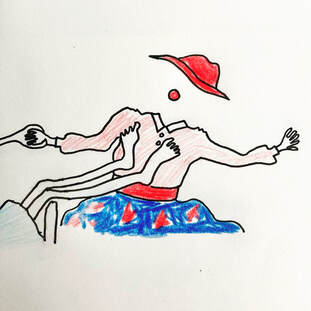
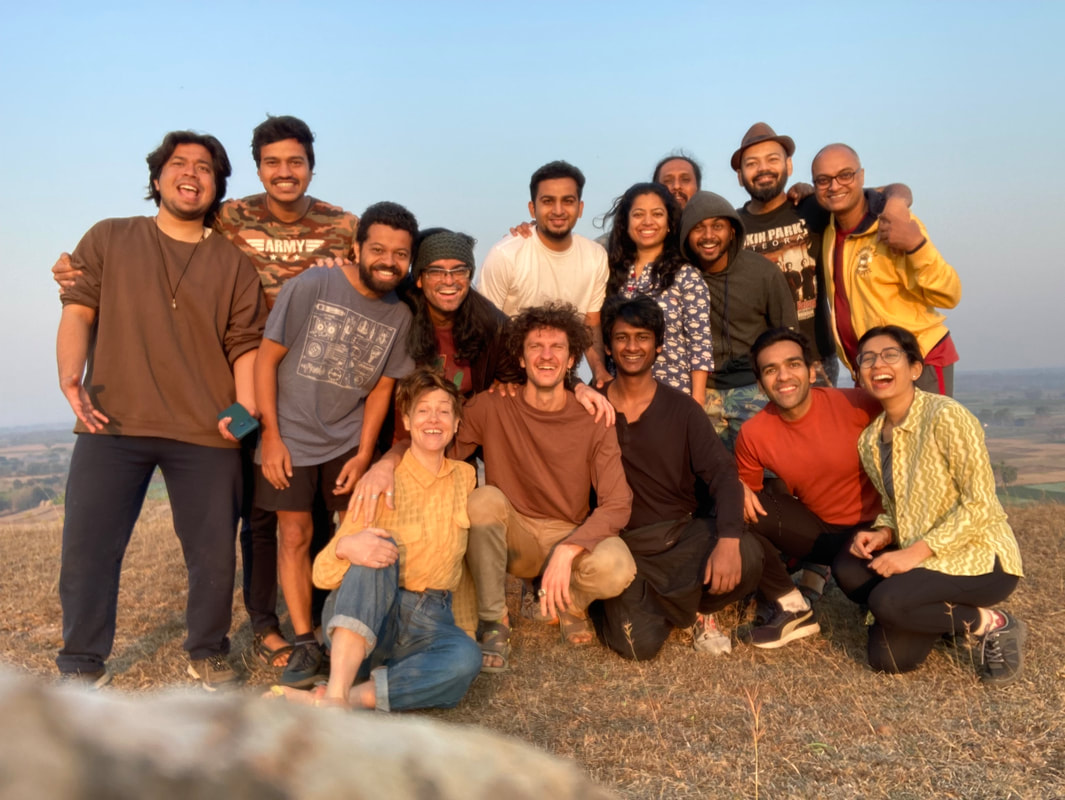
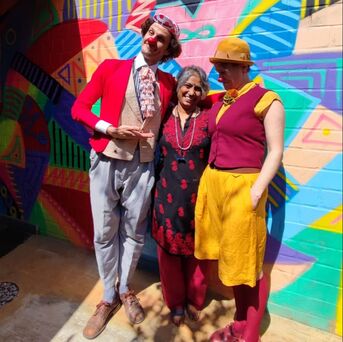
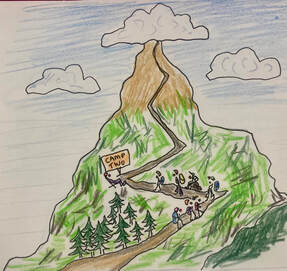
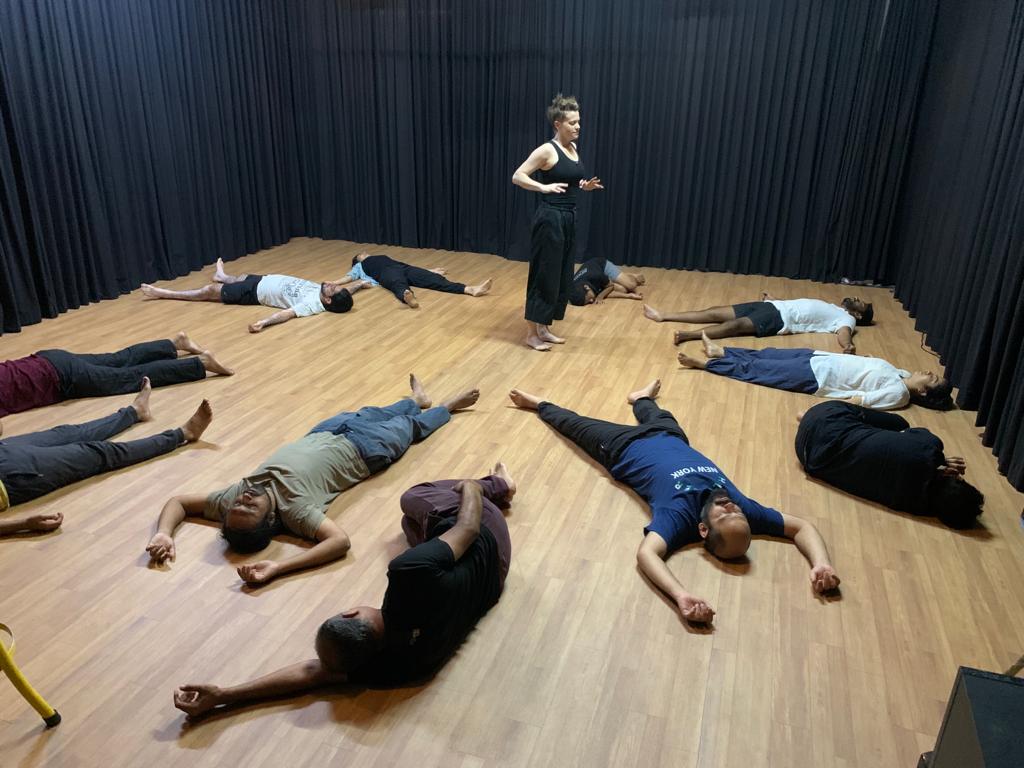
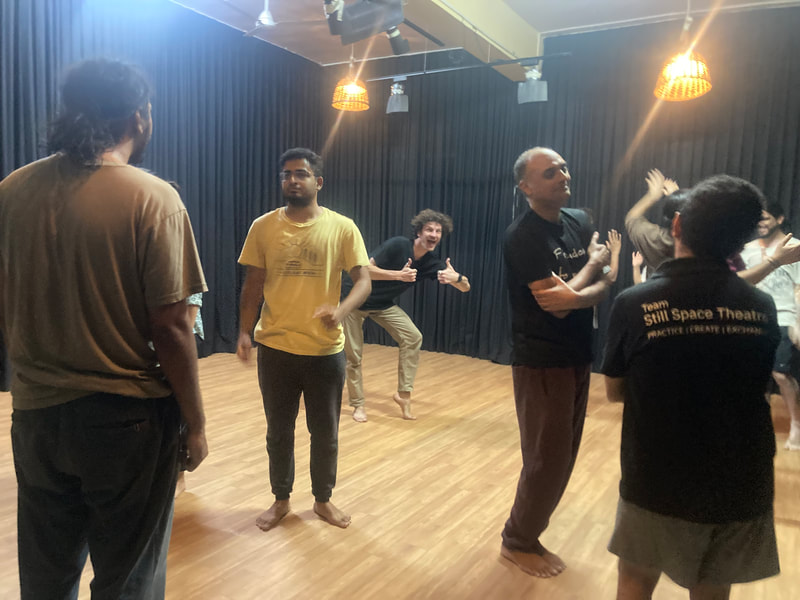
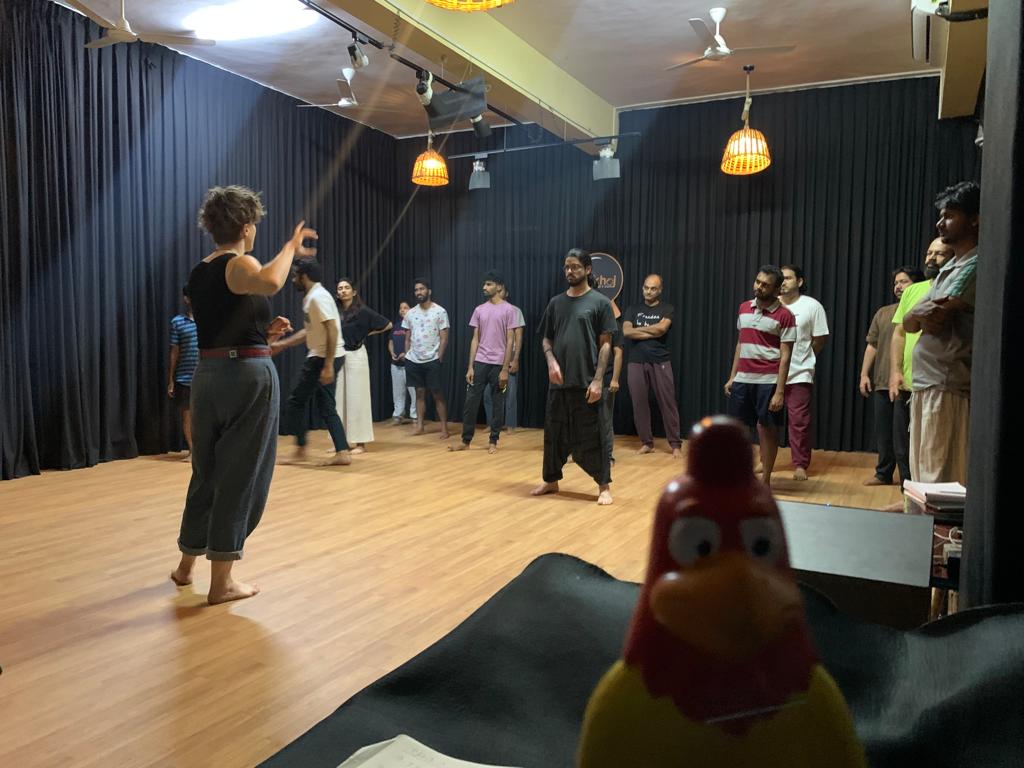
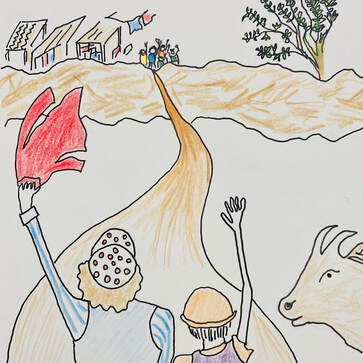
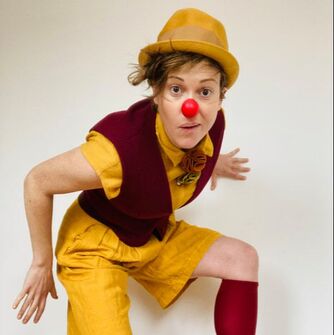
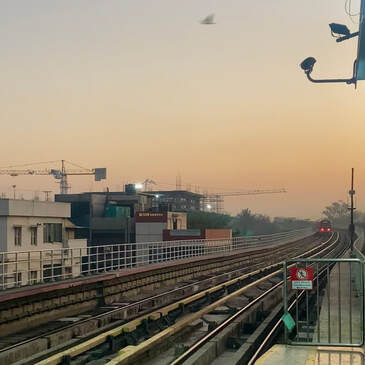
 RSS Feed
RSS Feed